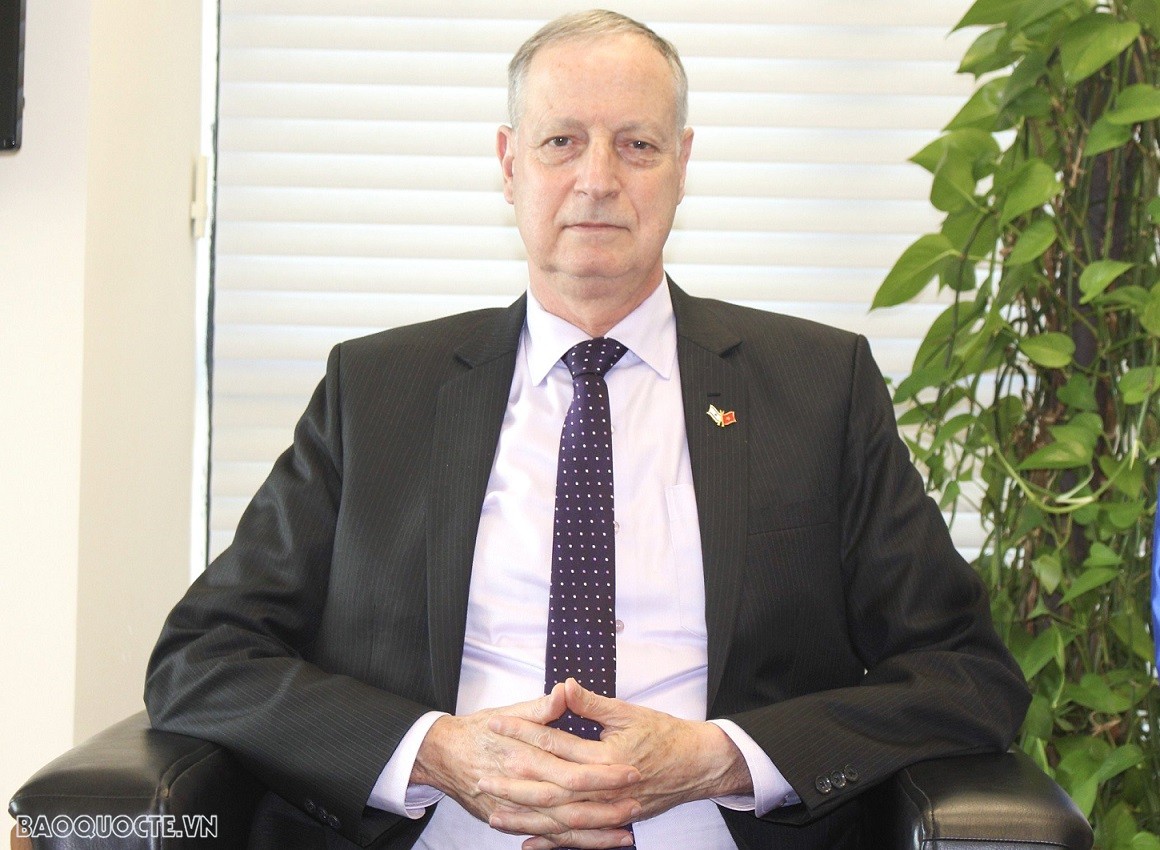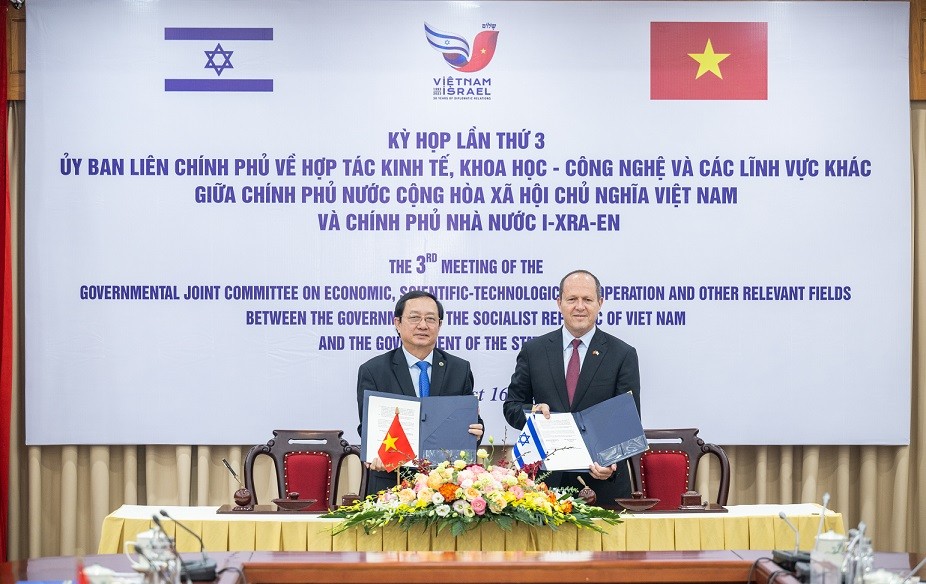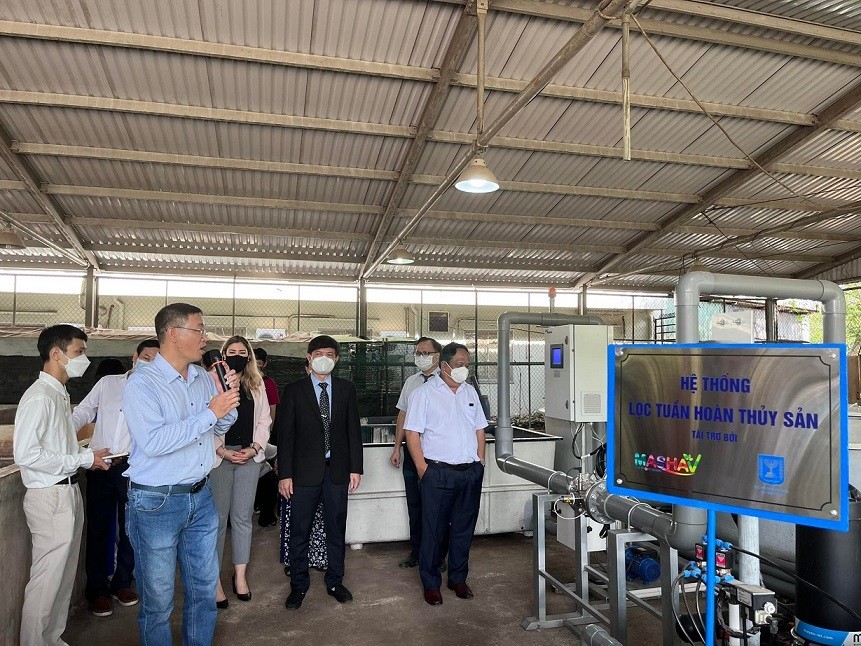
Circular economy in Vietnam is more than an idea: Israeli Ambassador
Latest
 |
| Israeli Ambassador to Vietnam Yaron Mayer. (Photo: Linh Chi) |
Green economy is becoming a popular development model among countries around the world. And Israel and Vietnam are no exceptions. How do you evaluate this model in the two countries?
Now, green growth strategy, both in Vietnam and Israel, as well as other countries, become a major part of government policy. We are very happy to see that Vietnam is taking a lead in a few aspects, in developing technologies, introducing policies. It shows us that this partnership can grow and we can do many things together.
At the recent World Economic Forum (WEF 2024), Vietnamese Prime Minister publicly put the issue of green economic development first and said that the country is suffering from climate change more than other countries.
In Israel, when you talk about this economy, we're talking about planning what we need to do such as long-term planning on maintenance, recycling and reuse. We have an initiative to convert Israel into a global leader in clean tech area.
We organize conferences and international events that bring together experts, ensuring a platform for people to not only witness Israel's endeavors but also to gain insights into global practices and foster collaborative efforts. Israel is eager to share its well-acknowledged expertise in water management, irrigation, and water usage with other nations, fostering cooperation and knowledge exchange on these critical subjects. Technology has become the core of our greener effort. Take Ormat, for instance, an enterprise harnessing geothermal energy for power plants, effectively contributing to the deceleration of global warming.
Regarding marine ecologies, we are establishing hubs in diverse regions. These ecosystems facilitate collaboration among academic institutions, private sectors, government entities, and regional authorities, fostering the development and implementation of policies. The concept of these small regional hubs is highly pertinent to other countries, including Vietnam.
What are prospects for cooperation between Vietnam and Israel? What do the two countries need to do to promote green economic development?
The prospect is very good. There is a potential for great collaboration in the inter-governmental sector, private sector and academics.
We are discussing it in different opportunities. The most important one recently was in the inter-governmental committee meeting in Hanoi last year. This event was chaired by Vietnamese Minister of Science and Technology and Israel Minister of Economy, with other experts.
 |
| Inter-governmental committee meeting in Hanoi on August 16, 2023. (Photo: Embassy of Israel in Vietnam) |
During this meeting, a protocol was signed, including a lot of topics about green economy and ways to promote collaboration. The two countries recently signed a free trade agreement, making a milestone as one of the most advanced free trade agreements.
Furthermore, we are also trying to work together on a few projects with other international partners. One noteworthy initiative involves conducting research and devising solutions to address the challenges posed by the salination of water in the Mekong Delta.
With local partners, we also took part in high-level dialogue platforms, notably with Ambassador Gideon Behar on the issue of circular economy and expert Gil Shaki on green growth last year. They discussed ideas and proposals with various Vietnamese stakeholders and shared Israel’s extensive experience in waste water recycling, climate innovation and green energy.
In Israel we proved that when you have right policy, you can stop damage to the environment and make life better, cleaner, safer and healthier.
We are also putting a lot of emphasis on the innovation side, working together among research institutions and universities, as well as encouraging students and researchers from both Israel and Vietnam to work together in an incubator where they can get a solution by mutual ideas, mutual research.
Israeli International Development Agency (MASHAV) offers training in fields of water Irrigation, renewable energy, green and organic agriculture, climate change solutions and others. Quite a lot of Vietnamese are getting this opportunity to participate in training. Our Embassy tries to create more opportunities for Vietnamese.
Faced with environmental pollution and resource depletion which increasingly and negatively impacting human life, many countries have proactively built and developed circular economies. As Israel is also going in this direction, could you share about Israel's circular economy model?
The circular economy is a very important model that we should encourage. It's important to have good ideas and open awareness, but it needs planning because it takes time to implement.
Another point is innovation. We put a lot of focus on renewable energy, alternative fuels, which are something that can be very relevant for the global.
Israel is small country, however, it is big in research of renewable energy, solar energy is being developed, and we share this with other countries. Israel has resource efficiency knowledge centers, which is collecting ideas and information from other places, and putting it for public use.
We built an industrial zone called Ne’ot Hovav in the Negev desert, working on hazardous waste disposal. Recycling plastics and industrial waste are processing there, along with production of gas and fuel, creating a concentrated facility that benefits the whole area.
 |
| The embassy of Israel in Vietnam donated a circulating filtration system to Ho Chi Minh City University of Agriculture and Forestry. |
How do you evaluate the development of circular economy in Vietnam? What experiences can Vietnam learn from Israel? Can Israel and Vietnam cooperate on circular economy issues?
I'm happy to say that circular economy in Vietnam is more than an idea, it's implemented and introduced in many sectors, and it's recognized by leaders and by different organizations.
There is a Vietnam circular hub, which has different partners, international, private sector and public sector. I have learned so much about policies, national plan, for circular economy, policy, dialogue in the industrial waste, eco-design, research and application in different regions.
I think it's part of our duty as an Embassy to create awareness and make sure that Vietnamese and different sectors will know about possible collaboration with Israel.
As an Embassy, we are poised to become a member in the Vietnam Circular Economy Hub. Through this platform, we plan to share our ideas, inspiring stories and opportunities, ranging from training initiatives to cutting-edge concepts such as superfood. Our goal is to contribute to the collective pool of knowledge and foster collaboration. We firmly believe that increased cooperation leads to the sharing of knowledge, which ultimately benefits the global community.
During my travels across various regions of Vietnam, I've observed a significant presence of agricultural sectors, an area where Israel is deeply involved in Vietnam. We recognize the potential for improvement by integrating new technologies or experimenting with different types of grains, and we are eager to explore and contribute to these advancements.
When I go to areas like Gia Lai and Dak Lak, I see there are many opportunities to develop a circular economy because the farmers are very talented, young and motivated. So I think we can work together with farmers. We can work with these people, and we can share our ideas directly with farmers, and through not only the government institution, but also directly with business enterprises.
The free trade agreement signed recently gives us another important tool that allows private sector to reach much wider, to many more people in farmers sector in Vietnam, and show new technologies. To sum up, I hope that this approach is integrated. In Israel we have the integration between the Government, public, academic and kind of regional hub.
How do you feel about Tet in Vietnam?
I am excited to celebrate Tet in Vietnam and extend warm Tet greetings to all my Vietnamese friends, regardless of their where-about. This year, together with my family I plan to explore the central region of Vietnam, adding a new dimension to our Tet celebration.
This marks my second Tet in Vietnam, but it holds special significance as the first one after concluding a whole year filled with diverse experiences. It brings a profound understanding of the beauty and importance of this festive occasion, a moment that encapsulates the conclusion of an entire year.
Reflecting on the past year fills us with pride as we have achieved significant milestones. Highlights include the signing of the free trade agreement, successful visits, and fruitful exchanges between leaders and delegations across various fields. These accomplishments make Tet even more meaningful as we cherish the successes and look forward to continued collaboration in the coming year.
Finally, I would like to send my best wishes to the readers of The World and Vietnam Report for the Happy Lunar New Year. And I wish Vietnam a great fruitful, happy, prosperous year of the dragon, and also wish continuing our good friendship and developing the collaboration between Vietnam and Israel in many fields, including people-to-people, economics, education, culture, innovation and so on.
Thank you so much!












